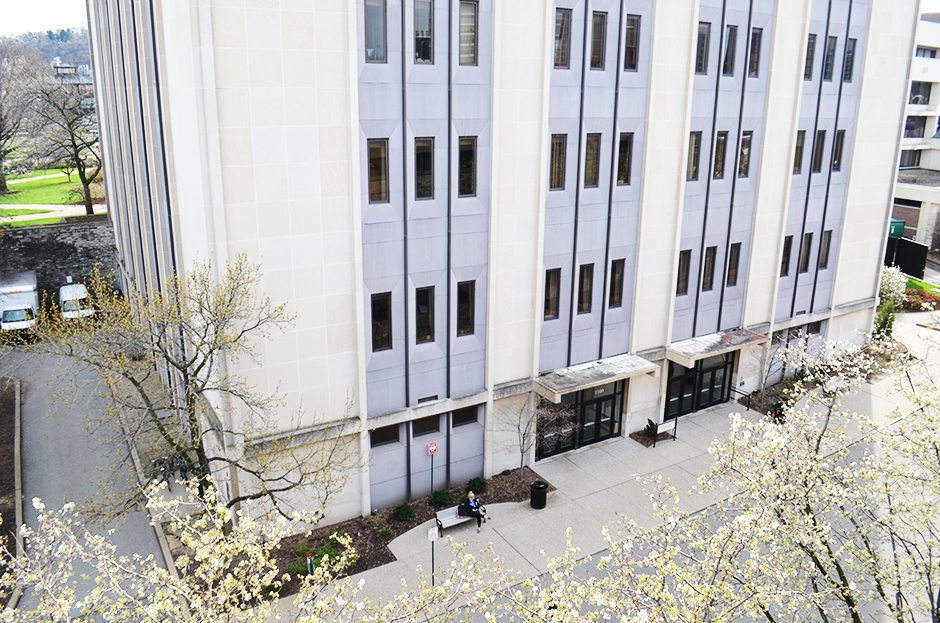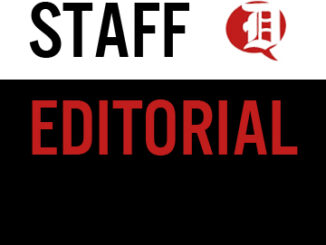
A photo of College Hall, home of the McAnulty School of Liberal Arts. The NLRB ruled that adjuncts at DU are allowed to unionize, with the exception of theology.

A picture of College Hall, the home of the McAnulty College of Liberal Arts. Duquesne announced the closure of the DU Press, and other cuts are incoming.
Brandon Addeo | News Editor
Despite an attempt from the Duquesne University Press to reduce its subsidy of over $300,000 from the university, Duquesne officials rejected the trimmed budget and announced March 29 that the publishing entity will be shuttered in the coming months.
This comes at a time when the university plans to reallocate $1.5 million of its Academic Affairs budget, according to Duquesne spokeswoman Bridget Fare. This reallocation means the university will cut funding from some schools and departments, which include the liberal arts college and the law school, and give it to other programs, including nursing and biomedical engineering. Fare said the decision to reallocate funds is partially based on the schools’ enrollment numbers. According to Fare, the McAnulty College of Liberal Arts will experience a $500,000 cut. This is one third of the overall cuts being made, although McAnulty is one of just 10 academic schools at Duquesne.
Fare added Duquesne gives more money to its Academic Affairs budget than similar Catholic universities such as Notre Dame, Dayton and Fordham. She also said while the DU Press operates under the Academic Affairs budget, it does not operate under the Liberal Arts budget and therefore does not contribute to the $500,000 reduction.
According to DU Press Director Susan Wadsworth-Booth, the Press submitted the altered budget proposal March 10 to Duquesne Provost Timothy Austin. The proposal, which stated the Press would reduce its annual subsidy of over $300,000 by nearly two-thirds, was rejected by Austin.
The Press also explored partnering with outside press to save money, but determined it “wouldn’t have reduced costs in a significant way,” Wadsworth-Booth said.
The March 29 statement from Duquesne’s Office of Marketing and Communications said the Press, which publishes scholarly books, had “persistent deficits [which] could not be alleviated without sacrificing the high quality for which the Press has been known.”
“Continuing the financial losses of the Press would take away funds necessary for programs that directly benefit Duquesne students and other academic programs,” the statement read. “Therefore, keeping the Press open is not a viable option.”
Austin originally announced the funding cut to the Press Feb. 3 in an email to faculty.
“In recent years, the Press has been unable to attract sales adequate to cover its costs, and the University has committed large sums to subsidizing its operation,” Austin wrote. “In an era of cost containment, this is no longer a viable path.”
Students from organizations in the liberal arts school — including the :Lexicon literary journal — will participate in a silent demonstration April 7 in support of the Press on the first floor of College Hall, where Austin and Duquesne President Ken Gormley are holding an annual meeting of McAnulty faculty to address the university’s strategic plan, in which the budget cut issue is likely to come up.
The Red Masquers theater group announced the demonstration in an email April 5, though the group is not organizing the demonstration in an official capacity, according to Dora Farona, vice president of the Masquers. She added though the Masquers are “in full support of the humanities and the Duquesne University Press.”
Student organizations have come out in support of the Press after the university announced its closure in February. :Lexicon and eight other student groups sent a letter Feb. 22 addressed to Gormley and Austin that voiced strong support of the Press.
“We see the closing of the Press not as an isolated incident of budget cutting, but as a declaration of unwillingness to support literature and the institutions by which it is studied and advanced,” the letter read.
“We cannot help but be reminded that just last year almost every member of the English Department’s adjunct faculty were released under the same excuse,” the letter continued, referencing the layoff of 10 Duquesne English adjunct professors in 2015.
:Lexicon editor-in-chief Erin Donahoe said a month passed with no response from Gormley or Austin after they sent the letter. The group then emailed Austin to ask if he had received the letter. He said he did and agreed to meet the student groups on April 21, according to Donahoe.
The university confirmed they would be closing the Press days later, she said.
“This decision and statement has ultimately nullified the importance of our upcoming meeting,” Donahoe said. “We never received any formal notification from President Gormley or Provost Austin that they had officially closed negotiations for the Press and they have not yet cancelled the meeting.”
She said :Lexicon decided to support the Press, which included a hashtag campaign of #SaveDUPress, because their two organizations have similar goals.
“University presses are unquestionably valuable as sources and distributors of scholastic and literary work, and Duquesne’s press in particular is a fantastic, nationally-renowned organization,” Donahoe said. “We feel that as a literary journal we need to show our support for other organizations devoted to literature, especially those on our own campus.”
The Press specializes in publishing material related to medieval studies, philosophy, psychology and religion, according to their website.
Correction: An earlier version of this article incorrectly stated the April 7 meeting was being held specifically to discuss the budget cuts. The meeting between the university president and school faculty is held annually.




